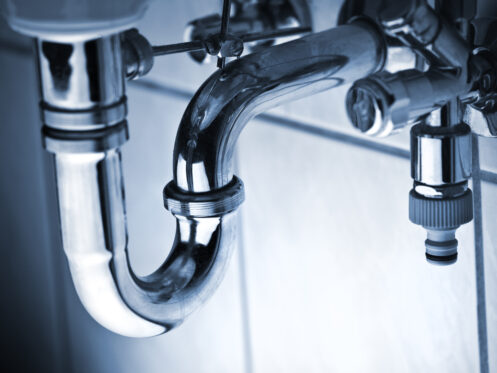Plumbers work with a wide selection of pipe materials for good reason. Choosing the wrong solution can leave you with a plumbing disaster and dozen of costly repairs. Installing the right pipes, on the other hand, will help preserve your plumbing system while enabling long-term reliability and performance.
You’ll find dozens of distinct piping materials at your local home improvement store. Each one has a specified use. In this guide, our team at Bumble Breeze will cover 10 different types of pipe materials and how engineers, builders, and plumbers use them for specific applications.
1. Polyvinyl Chloride (PVC)
Polyvinyl Chloride (PVC) is a top choice among plumbers. This material is lightweight and highly resistant to corrosion and chemicals. These features make it ideal for a diverse range of plumbing applications.
You’ll find PVC used most frequently in residential homes. It’s especially common for plumbing cold water lines. These low-cost pipes are, likewise, often used in drainage and irrigation systems. You can expect PCV pipes to last and perform 100 years or more for most applications.
2. CPVC (Chlorinated Polyvinyl Chloride)
Chlorinated Polyvinyl Chloride (CPVC) pipes are similar in construction to PVC. However, their chlorination treatment process makes them more durable. This additional protective layer allows CPVC to withstand higher temperatures for both hot and cold water supply lines.
CPVC pipes, like PVC, are common in residential settings, especially in situations that demand a high degree of temperature resistance. The chlorinated material allows them to channel extreme hot and cold water without compromising your plumbing system. These pipes are weather- and sunlight-resistant and can even help prevent bacterial attacks. Not unlike PVC, you can expect CPVC pipes to sustain their structural integrity over several decades — potentially even longer — under harsher conditions.
3. Cross-linked Polyethylene (PEX)
PEX, or Cross-linked Polyethylene, has become widely recognized as a safe and reliable modern plumbing solution. Plumbers use it for multiple applications, and it’s also relatively simple to install. This material is highly resistant to freezing and chemicals, making it ideal for buildings in cold weather regions.
Plumbers prefer this solution because it’s flexible, and the reduced connections often translate to fewer leaks. You’ll often find PEX piping in radiant floor heating systems. This particular pipe is effective at helping radiant heating equipment deliver efficient heat distribution across indoor flooring and other surfaces. The pipes’ high temperature and chemical resistance similarly help ensure the delivery of a clean water supply.
4. Copper
Copper is one of the oldest home plumbing materials. This piping option is known for its durability and antimicrobial properties. While copper isn’t used as frequently as it was in the past, it’s still a reliable choice and can even be necessary under some circumstances.
Copper can handle extreme temperatures. This makes the pipes ideal for plumbing systems running extreme hot water or those located in cold climates. The pipes offer a long-lasting solution for channeling a clean, safe water supply to your property. Given its thermal conductivity properties, copper is often found in HVAC systems as refrigerant lines. While not the most affordable option, copper can be a smart alternative to iron or steel piping because it’s anti-corrosive.
5. Galvanized Steel
Galvanized steel is coated with a layer of zinc. This protects the piping against rusting while increasing its durability. While this material is strong, it’s also considerably heavier than other modern piping solutions. You’ll typically find galvanized steel in the plumbing systems of older homes, and they have been shown to stand the test of time.
The main issues with galvanized steel are that it rusts and can easily break when water freezes inside pipes. While galvanized steel is still considered safe for use in home plumbing systems, newer and more modern solutions have since largely replaced it. Galvanized steel remains a viable option for certain applications. Nowadays, you’ll see it more often in scaffolding, fences, and farm irrigation systems than in home plumbing systems.
6. Stainless Steel
Stainless steel is perhaps best known for its corrosion resistance. However, it’s undoubtedly more recognized for its mirror-like aesthetic qualities, making it ideal for applications where the pipes are exposed to view. Stainless steel can last a long time because it won’t easily corrode or tarnish.
Since they’re easy to keep clean, stainless-steel pipes are commonly used in commercial kitchens, hospitals, and other settings that require a highly sanitized environment. Stainless steel is also widely utilized in industrial piping systems because it can withstand chemicals, high temperatures, and extreme environmental conditions. Their visual appeal makes stainless-steel pipes the preferred choice for multiple demanding applications.
7. Cast Iron
While immensely durable, cast iron is an extremely heavy piping solution. Cast-iron piping is often used in waste disposal systems where leak prevention and lasting performance are critical. For this same reason, you’ll also find it in underground drainage systems that transport large supplies of wastewater and stormwater.
While its weight can make installations a challenge, the benefits of using cast iron — such as its longevity and sound-dampening qualities — outweigh these drawbacks. It’s an ideal choice for commercial and residential applications that require strong, dependable piping and need to minimize indoor noise pollution.
8. ABS (Acrylonitrile Butadiene Styrene)
Acrylonitrile Butadiene Styrene (ABS) is a rigid thermoplastic, and it’s preferred solution in low-temperature environments, particularly those underground. The material is highly shock resistant and its impressive tensile strength means you can depend on ABS for a diverse range of plumbing needs.
You’ll encounter ABS most frequently in drain-waste vent pipes that handle household wastewater. ABS is also a common material found in sewer systems because it’s more durable than PCV pipes and displays a high tolerance for low temperatures. Since these pipes handle tough subsoil conditions outdoors, ABS is often the go-to, low-cost solution for underground piping systems.
9. Concrete Pipes
Concrete pipes are among the strongest and longest-lasting plumbing solutions. This type of piping can perform optimally over decades with minimal maintenance. Concrete pipes, however, are primarily reserved for use in major water supply lines that require an impenetrable pipe that can deliver water over long distances.
You’ll also see concrete pipes used for sewage transport. They offer an efficient and secure means of managing large volumes of wastewater. Their ability to withstand heavy loads and virtually every environmental condition makes concrete pipes a top choice for elaborate infrastructural projects like municipal sanitation systems and treatment plant channeling.
10. High-Density Polyethylene (HDPE)
When plumbers need a durable solution to use for multiple applications, they often turn to High-Density Polyethylene (HDPE) pipes. This type of piping is made of three polyethylenes and boasts an impressive strength-to-density ratio. The material is also highly resistant to chemicals, corrosion, and impacts.
HDPE pipes are most commonly found in water supply and gas pipeline systems developed as long-term infrastructure projects. HDPE’s flexibility and resistance to environmental stressors lend themselves well to agricultural and industrial applications. This lightweight pipe also allows for easy installation, helping builders and building owners reduce their overhead expenses.
Selecting the Right Piping Material
Familiarizing yourself with the various types of pipes used in plumbing systems can help you better understand the scope and pricing of your next project. At Bumble Breeze, we offer class-leading plumbing services to businesses and homeowners in Las Vegas. We also specialize in the full range of HVAC and indoor air quality services that cater specifically to our unique desert region. From expert plumbing installation and repiping, to affordable HVAC solutions, our unmatched customer service can make your next project a success.
Contact us at Bumble Breeze today to schedule your free initial consultation!


